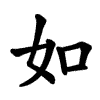Definify.com
Definition 2025
千
千
| ||||||
|---|---|---|---|---|---|---|
Translingual
| Stroke order | |||
|---|---|---|---|

| |||
| Stroke order | |||
|---|---|---|---|
| | |||
Han character
千 (radical 24 十+1, 3 strokes, cangjie input 竹十 (HJ), four-corner 20400, composition ⿱丿十)
See also
Descendants
References
- KangXi: page 155, character 19
- Dai Kanwa Jiten: character 2697
- Dae Jaweon: page 351, character 2
- Hanyu Da Zidian: volume 1, page 59, character 1
- Unihan data for U+5343
Chinese
Etymology 1
|
simp. and trad. |
千 | |
|---|---|---|
| alt. forms | 仟 financial | |
Glyph origin
| Historical forms of the character 千
| ||||
|---|---|---|---|---|
| Oracle bone script | Bronze inscriptions | Bamboo and silk script | Large seal script | Small seal script |
 |
 |
 |
 |
 |
| Characters in the same phonetic series (人) (Zhengzhang, 2003) | |
|---|---|
| Old Chinese | |
| 千 | *sn̥ʰiːn |
| 仟 | *sn̥ʰiːn |
| 芊 | *sn̥ʰiːn, *sn̥ʰiːns |
| 阡 | *sn̥ʰiːn |
| 汘 | *sn̥ʰiːn |
| 迁 | *sn̥ʰiːn |
| 杄 | *sn̥ʰiːn |
| 人 | *njin |
| 仁 | *njin |
| 朲 | *njin |
| 佞 | *neːŋs |
Phono-semantic compound (形聲, OC *sn̥ʰiːn) : semantic 一 (“one, signifying a number”) + phonetic 人 (OC *njin). The Old Chinese pronunciations of 千 (OC *sn̥ʰiːn) and 人 (OC *njin) were similar. For the component 人, compare its combining form 亻.
The traditional explanation holds that the extra line indicates an extension (see the etymologies of 年 and 延). 千 has the meaning one thousand because one thousand is a number that is reached by extending one's counting.
Pronunciation
- Mandarin
- Cantonese (Jyutping): cin1
- Hakka (Sixian, PFS): chhiên
- Min Dong (BUC): chiĕng
- Min Nan
- Wu (Wiktionary): qi (T1)
- Mandarin
- (Standard Chinese, Beijing)+
- Pinyin:
- Zhuyin: ㄑㄧㄢ
- Wade-Giles: ch'ien1
- Gwoyeu Romatzyh: chian
- IPA (key): /t͡ɕʰi̯ɛn⁵⁵/
-

- (Standard Chinese, Beijing)+
- Cantonese
- (Standard Cantonese, Guangzhou)+
- Jyutping: cin1
- Yale: chīn
- Cantonese Pinyin: tsin1
- IPA (key): /t͡sʰiːn⁵⁵/
- (Standard Cantonese, Guangzhou)+
- Hakka
- (Sixian, incl. Miaoli and Meinong)
- Pha̍k-fa-sṳ: chhiên
- Hakka Romanization System: qien´
- Hagfa Pinyim: qian1
- IPA: /t͡ɕʰi̯en²⁴/
- (Sixian, incl. Miaoli and Meinong)
- Min Dong
- (Fuzhou)
- Bàng-uâ-cê: chiĕng
- IPA (key): /t͡sʰieŋ⁵⁵/
- (Fuzhou)
- Min Nan
- (Hokkien: Xiamen, Zhangzhou, mainstream Taiwanese)
- Pe̍h-ōe-jī: chheng
- Tâi-lô: tshing
- Phofsit Daibuun: zhefng
- IPA (Xiamen): /t͡ɕʰiɪŋ⁴⁴/
- IPA (Zhangzhou): /t͡ɕʰiɪŋ⁴⁴/
- IPA (Taipei): /t͡ɕʰiɪŋ⁴⁴/
- IPA (Kaohsiung): /t͡ɕʰiɪŋ⁴⁴/
- (Hokkien: Quanzhou)
- Pe̍h-ōe-jī: chhuiⁿ
- Tâi-lô: tshuinn
- Phofsit Daibuun: zhvuy
- IPA (Quanzhou): /t͡sʰuĩ³³/
- (Hokkien: Xiamen, Quanzhou, Zhangzhou, mainstream Taiwanese)
- Pe̍h-ōe-jī: chhian
- Tâi-lô: tshian
- Phofsit Daibuun: chiefn
- IPA (Xiamen): /t͡ɕʰiɛn⁴⁴/
- IPA (Quanzhou): /t͡ɕʰiɛn³³/
- IPA (Zhangzhou): /t͡ɕʰiɛn⁴⁴/
- IPA (Taipei): /t͡ɕʰiɛn⁴⁴/
- IPA (Kaohsiung): /t͡ɕʰiɛn⁴⁴/
- Note: chheng/chhuiⁿ - vernacular; chhian - literary.
- (Teochew)
- Peng'im: coin1 / cain1
- Pe̍h-ōe-jī-like: tshoiⁿ / tshaiⁿ
- IPA (key): /t͡sʰõĩ³³/, /t͡sʰãĩ³³/
- Note: coin1 - Chaozhou; cain1 - Huilai.
- (Hokkien: Xiamen, Zhangzhou, mainstream Taiwanese)
- Wu
- (Shanghainese)
- Wiktionary: qi (T1)
- IPA (key): /t͡ɕʰi⁵³/
- (Shanghainese)
- Dialectal data▼
| Variety | Location | 千 |
|---|---|---|
| Mandarin | Beijing | /t͡ɕʰian⁵⁵/ |
| Harbin | /t͡ɕʰian⁴⁴/ | |
| Tianjin | /t͡ɕʰian²¹/ | |
| Jinan | /t͡ɕʰiã²¹³/ | |
| Qingdao | /t͡sʰiã²¹³/ | |
| Zhengzhou | /t͡sʰian²⁴/ | |
| Xi'an | /t͡ɕʰiã²¹/ | |
| Xining | /t͡ɕʰiã⁴⁴/ | |
| Yinchuan | /t͡ɕʰian⁴⁴/ | |
| Lanzhou | /t͡ɕʰiɛ̃n³¹/ | |
| Ürümqi | /t͡ɕʰian⁴⁴/ | |
| Wuhan | /t͡ɕʰiɛn⁵⁵/ | |
| Chengdu | /t͡ɕʰian⁵⁵/ | |
| Guiyang | /t͡ɕʰian⁵⁵/ | |
| Kunming | /t͡ɕʰiɛ̃⁴⁴/ | |
| Nanjing | /t͡sʰien³¹/ | |
| Hefei | /t͡ɕʰiĩ²¹/ | |
| Jin | Taiyuan | /t͡ɕʰie¹¹/ |
| Pingyao | /t͡ɕʰie̞¹³/ | |
| Hohhot | /t͡ɕʰie³¹/ | |
| Wu | Shanghai | /t͡ɕʰi⁵³/ |
| Suzhou | /t͡sʰiɪ⁵⁵/ | |
| Hangzhou | /t͡ɕʰiẽ̞³³/ | |
| Wenzhou | /t͡ɕʰi³³/ | |
| Hui | Shexian | /t͡sʰe³¹/ |
| Tunxi | /t͡sʰiɛ¹¹/ | |
| Xiang | Changsha | /t͡sʰiẽ³³/ |
| Xiangtan | /t͡sʰiẽ³³/ | |
| Gan | Nanchang | /t͡ɕʰiɛn⁴²/ |
| Hakka | Meixian | /t͡sʰien⁴⁴/ |
| Taoyuan | /t͡sʰien²⁴/ | |
| Cantonese | Guangzhou | /t͡sʰin⁵³/ |
| Nanning | /t͡sʰin⁵⁵/ | |
| Hong Kong | /t͡sʰin⁵⁵/ | |
| Min | Xiamen (Min Nan) |
/t͡sʰian⁵⁵/ /t͡sʰiŋ⁵⁵/ |
| Fuzhou (Min Dong) | /t͡sʰieŋ⁴⁴/ | |
| Jian'ou (Min Bei) | /t͡sʰaiŋ⁵⁴/ | |
| Shantou (Min Nan) | /t͡sʰõi³³/ | |
| Haikou (Min Nan) |
/sin²³/ /sai²³/ |
| Rime | |
|---|---|
| Character | 千 |
| Reading # | 1/1 |
| Initial (聲) | 清 (14) |
| Final (韻) | 先 (85) |
| Tone (調) | Level (Ø) |
| Openness (開合) | Open |
| Division (等) | IV |
| Fanqie | 蒼先切 |
| Reconstructions | |
| Zhengzhang Shangfang |
/t͡sʰen/ |
| Pan Wuyun |
/t͡sʰen/ |
| Shao Rongfen |
/t͡sʰɛn/ |
| Edwin Pulleyblank |
/t͡sʰɛn/ |
| Li Rong |
/t͡sʰen/ |
| Wang Li |
/t͡sʰien/ |
| Bernard Karlgren |
/t͡sʰien/ |
| Expected Mandarin Reflex |
qiān |
| Baxter-Sagart system 1.1 (2014) | |
|---|---|
| Character | 千 |
| Reading # | 1/1 |
| Modern Beijing (Pinyin) |
qiān |
| Middle Chinese |
‹ tshen › |
| Old Chinese |
/*s.n̥ˤi[ŋ]/ |
| English | thousand |
Notes for Old Chinese notations in the Baxter-Sagart system: * Parentheses "()" indicate uncertain presence; | |
| Zhengzhang system (2003) | |
|---|---|
| Character | 千 |
| Reading # | 1/1 |
| No. | 10792 |
| Phonetic component |
人 |
| Rime group |
眞 |
| Rime subdivision |
1 |
| Corresponding MC rime |
千 |
| Old Chinese |
/*sn̥ʰiːn/ |
| Notes | 小徐人聲,甲文乃借人加一 |
Definitions
千
See also
| Chinese numbers | ||||||||||||||||
|---|---|---|---|---|---|---|---|---|---|---|---|---|---|---|---|---|
| 0 | 1 | 2 | 3 | 4 | 5 | 6 | 7 | 8 | 9 | 10 | 102 | 103 | 104 | 108 | 1012 | |
| Cardinal | 〇 | 一 | 二 | 三 | 四 | 五 | 六 | 七 | 八 | 九 | 十 | 百 | 千 | 萬 万 |
億 亿 |
兆 |
| Financial | 零 | 壹 | 貳 贰 |
參 叁 |
肆 | 伍 | 陸 陆 |
柒 | 捌 | 玖 | 拾 | 佰 | 仟 | 萬 万 |
億 亿 |
兆 |
Compounds
|
|
|
Etymology 2
| For pronunciation and definitions of 千 – see 韆. (This character, 千, is the simplified form of 韆.) |
Notes:
|
Japanese
Kanji
Readings
Etymology
| Kanji in this term |
|---|
| 千 |
|
せん Grade: 1 |
| on'yomi |
From Middle Chinese 千 (tshen, “thousand”).
Pronunciation
Noun
- thousand
Derived terms
Number
References
- ↑ 2006, 大辞林 (Daijirin), Third Edition (in Japanese), Tōkyō: Sanseidō, ISBN 4-385-13905-9
- ↑ 1998, NHK日本語発音アクセント辞典 (NHK Japanese Pronunciation Accent Dictionary) (in Japanese), Tōkyō: NHK, ISBN 978-4-14-011112-3
Korean
Hanja
千 • (cheon)
Eumhun:
- Sound (hangeul): 천 (revised: cheon, McCune-Reischauer: ch'ŏn)
- Name (hangeul): 일천()
- This term needs a translation to English. Please help out and add a translation, then remove the text
{{rfdef}}.
Vietnamese
Han character
千 (thiên)
- This term needs a translation to English. Please help out and add a translation, then remove the text
{{rfdef}}.